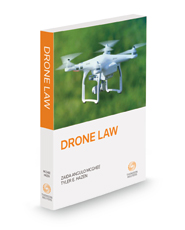Drone Law Explores Regulations Around Rapidly Evolving Technology
Amid rapid expansion in both commercial and recreational drone operations, a new publication from Thomson Reuters examines the range of legal issues surrounding unmanned aerial systems. Drone Law offers comprehensive, up-to-date coverage and analysis of federal statutes and regulations; Federal Aviation Administration (FAA) guidelines; and state and local laws.
“Drones are becoming integral parts of everyday life,” said co-author Zaida Angulo McGhee. “Drones help big-box retailers deliver orders to customers, farmers monitor crops and police departments conduct search-and-rescue-missions. And people are increasingly using drones for recreational purposes. As the technology quickly evolves, lawmakers and regulators are scrambling to keep up. Regulations are continuously being enacted at the state and federal levels, and FAA processes are being created to allow growing drone operations, including drone activity in U.S. airspace. We are regularly updating the content so that it is current with these legal developments.”
 Drone Law creates a framework adaptable to new developments – statutory or decisional. The book will be updated twice annually in print, or as needed, due to changes in the law; it will be updated online and in the eBook version to track key developments.
Drone Law creates a framework adaptable to new developments – statutory or decisional. The book will be updated twice annually in print, or as needed, due to changes in the law; it will be updated online and in the eBook version to track key developments.
Co-author Tyler Hazen explained the book’s broad reach. “Legal professionals, educators, and drone manufacturers, as well as commercial, recreational, and public drone operators and component part manufacturers and suppliers, will benefit from a thorough understanding of the legal requirements applicable to various drone products and operations.”
Drone Law gives significant attention to tort law, constitutional principles, penalties, criminal violations, and contract issues. To purchase the book and learn more, click here.